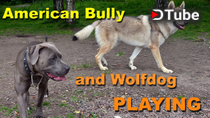
From the video archives. Filmed and Produced in July/August 2015.
Czechoslovakian Wolfdog / Vlcak Lovec "Quaggy II" Od Úhoště and American Bully Bonita running, chasing, wrestling, and playing at Pilegarden Dog Park, Gothenburg, Sweden July 20, 2015.
Czechoslovakian Wolf Dog Lovec was born on January 28, 2014 and was 1 year and 6 months old in this video. American Bully Bonita was about 3 years old in this video. At the filming of this video, Lovec and Bonita had known each other for about three weeks and played almost daily.
Bonita was a bit dominant in the beginning, as Lovec was a new member to the pack. But they paused the play at the exact right times (as seen in this video). And as they started to live together, Bonita was virtually always in the top-dog role during play. Despite this “imbalance”, Lovec always sought Bonita’s company and often invited her to play. Relationships, interactions and play between dogs can vary enormously, just as with humans. Dogs are simply awesome!
Note: When playing, the dog and the wolf inhibit their bites and sometimes voluntarily give their play-partner a competitive advantage by, for example, rolling on their backs or letting themselves be caught during a chase — behaviors that would never happen during real fighting. Lovec does this a lot, as he's self-assured and mentally strong – he’s not interested in showing off or to play in a dominant manner.
In addition to inhibited bites, open mouth play, and self-handicapping — dogs, and especially wolf dogs, clearly demarcate play by employing signals, such as play bows (putting the head and chest to the ground while keeping the rear half up) and exaggerated, bouncy movements.
These exaggerated pattern, suggests that playing dogs recognize moments when their behavior can be misinterpreted as aggression or fighting and compensate by reminding their play partner that, “I’m friendly, I'm playing.”
Play fighting is the primary method used to form new relationships and develop lasting friendships between dogs. Although play is mostly for fun, it also offers serious opportunities to communicate with another dog. In this sense, play is a kind of language.
Research suggests that animals play to help form social bonds, enhance cognitive development, exercise and/or practice coping skills for life’s unexpected situations. All of these benefits, if real, are important to our dogs.
There is NO dog fighting in this video, only natural dog vs dog play (and play fighting).
Music:
"Last Stand" by Mathias Bartoll, 2015.
YouTube Music Video:
SoundCloud: https://soundcloud.com/mathias-bartoll/last-stand
▶️ DTube
▶️ IPFS